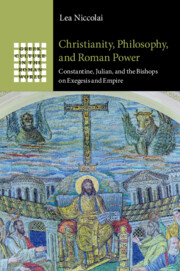 Christianity, Philosophy, and Roman Power
Christianity, Philosophy, and Roman Power from Part I - At Constantius’ Court: Julian Caesar
Published online by Cambridge University Press: 07 July 2023
Chapter 1 draws on Julian’s earliest surviving oration – the Letter to Themistius – to illustrate the interaction between Julian’s early rhetoric and the political discourse developed at the court of Constantius II. The first section challenges scholarly readings of the Letter as voicing a rejection of the late antique ideal of the sovereign as ensouled law. It argues that Julian’s primary intent in this text lies rather in a desire to advertise his exegetical skills at the expense of his interlocutor, the famous philosopher Themistius. The second sectio contextualises Julian’s ambition in the context of third- and fourth-century debates on the relationship between leadership and culture. It shows that this theme was invested with particular significance by Christian authors – such as Lactantius and Eusebius – who used it in claiming Christianity’s intellectual dominance over pagan thinking. This testifies to the existence of a shared perception that cultural authority legitimised political authority but also signals the ambitions of Christian intellectuals to negotiate Christianity’s cultural prestige in conversation with the Roman elites.
To save this book to your Kindle, first ensure [email protected] is added to your Approved Personal Document E-mail List under your Personal Document Settings on the Manage Your Content and Devices page of your Amazon account. Then enter the ‘name’ part of your Kindle email address below. Find out more about saving to your Kindle.
Note you can select to save to either the @free.kindle.com or @kindle.com variations. ‘@free.kindle.com’ emails are free but can only be saved to your device when it is connected to wi-fi. ‘@kindle.com’ emails can be delivered even when you are not connected to wi-fi, but note that service fees apply.
Find out more about the Kindle Personal Document Service.
To save content items to your account, please confirm that you agree to abide by our usage policies. If this is the first time you use this feature, you will be asked to authorise Cambridge Core to connect with your account. Find out more about saving content to Dropbox.
To save content items to your account, please confirm that you agree to abide by our usage policies. If this is the first time you use this feature, you will be asked to authorise Cambridge Core to connect with your account. Find out more about saving content to Google Drive.